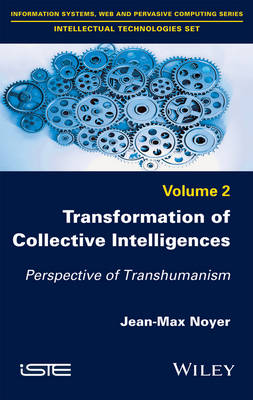
Transformation of Collective Intelligences
ISTE Ltd and John Wiley & Sons Inc (Verlag)
978-1-84821-910-6 (ISBN)
There is a great transformation of the production of knowledge and intelligibility. The "digital fold of the world" (with the convergence of NBIC) affects the collective assemblages of “thought”, of research. The aims of these assemblages are also controversial issues. From a general standpoint, these debates concern “performative science and performative society”. But one emerges and strengthens that has several names: transhumanism, post-humanism, speculative post-humanism. It appears as a great narration, a large story about the future of our existence, facing our entry into the Anthropocene. It is also presented as a concrete utopia with an anthropological and technical change. In this book, we proposed to show how collective intelligences stand in the middle of the coupling of ontological horizons and of the “process of bio-technical maturation”.
Noyer Jean-Max - Ma?tre de conférences Hors classe, HDR, Thèse d'état, Université de Nice Sophia Antipolis. Laboratoire I3M Toulon Var, Chercheur associé univerté de Paris 8 laboratoire paragraphe, Co-fondateur du GRICO. Consultant www.grico.fr (Recherche appliquée en Entreprises et Organisations)
Introduction ix
Chapter 1. Elements of the General Configuration and Adaptive Landscape of Collective Intelligences 1
1.1. The intertwined narratives of tangible utopias and brilliant futures 1
1.2. Intelligence is “always already collective and machined” 5
1.3. Collective intelligences in the weaving of data 9
1.4. Semiotics and statistics 13
1.5. Data cities and human becomings: the new milieus of intelligence 17
1.5.1. Open Data (OD): a heterogeneous movement, the contribution to novel forms of knowledge in question 22
1.6. Coupling OD/big data/data mining 32
1.7. The semantic web as intellectual technology 34
1.8. Toward understanding onto-ethologies 42
1.9. Marketing intelligences: data and graphs in the heat of passions 50
1.10. Personal data: private property as an open and unstable process 59
1.11. The figures of the network 64
1.12. Machinic interfaces: social subjection and enslavement 67
1.13. Collective intelligences and anthropological concerns 70
1.14. Toward a new encyclopedic state: first overview 74
1.15. Controversies and boundaries 78
1.16. The milieus of intelligence and knowledge 84
1.17. Which criteria for writings? 86
1.18. Collective intelligences of usage and doxic collective intelligences: the status of short forms 90
1.19. Collective intelligences, self-organization, “swarm” intelligences 92
1.20. Short forms, relinkage, relaunching 99
1.21. Insomniac commentary as a catastrophic correction of short forms 100
1.22. Twitter as a Markovian Territory: a few remarks 103
Chapter 2. Post- and Transhumanist Horizons 107
2.1. Some bioanthropotechnical transformations 107
2.2. What to do with our brain? 113
2.3. About transhumanism and speculative posthumanism 122
2.4. Epigenetic and epiphylogenetic plasticity 125
2.5. Speculative uncertainties 127
2.6. Trans- and posthumanism as they present themselves 152
Chapter 3. Fragmented Encyclopedism 169
3.1. Collective intelligences and the encyclopedic problem 169
3.2. The political utopia in store 170
3.3. Encyclopedism and digital publishing modes 174
3.4. A new documentary process 176
3.5. Fragmented encyclopedism: education/interfaces 190
3.6. Encyclopedism and correlations 192
3.6.1. “Correlation is enough”: the Anderson controversy, and the J. Gray paradigm and their limits 192
3.7. “Perplication” in knowledge 198
3.7.1. Doxic tension in fragmented encyclopedism and format accordingly 198
3.8. Networks of the digital environment 199
3.8.1. Variations of speed and slowness at the center of encyclopedic pragmatics 200
3.9. Knowledge and thought in fragmented encyclopedism 201
3.10. What criteriology for encyclopedic writings? 202
3.11. Borders in fragmented encyclopedism: autoimmune disorders and disagreement 205
3.12. Fragmented encyclopedism: a habitat for controversies? 207
3.13. Encyclopedism according to the semantic and sociosemantic web (ontologies and web): mapping(s) and semantic levels 209
3.14. From ontologies to “onto-ethologies” and assemblages 212
3.15. Fragmented encyclopedism in the digital age: metalanguage and combinatorial 214
3.15.1. Encyclopedism and doxic immanence field: the proliferation of short forms 216
3.16. From fragmented encyclopedism to gaseous encyclopedism 217
Bibliography 219
Index 233Conclusion
| Erscheinungsdatum | 03.06.2016 |
|---|---|
| Verlagsort | London |
| Sprache | englisch |
| Maße | 165 x 241 mm |
| Gewicht | 544 g |
| Themenwelt | Informatik ► Software Entwicklung ► User Interfaces (HCI) |
| Mathematik / Informatik ► Informatik ► Theorie / Studium | |
| ISBN-10 | 1-84821-910-5 / 1848219105 |
| ISBN-13 | 978-1-84821-910-6 / 9781848219106 |
| Zustand | Neuware |
| Haben Sie eine Frage zum Produkt? |
aus dem Bereich


